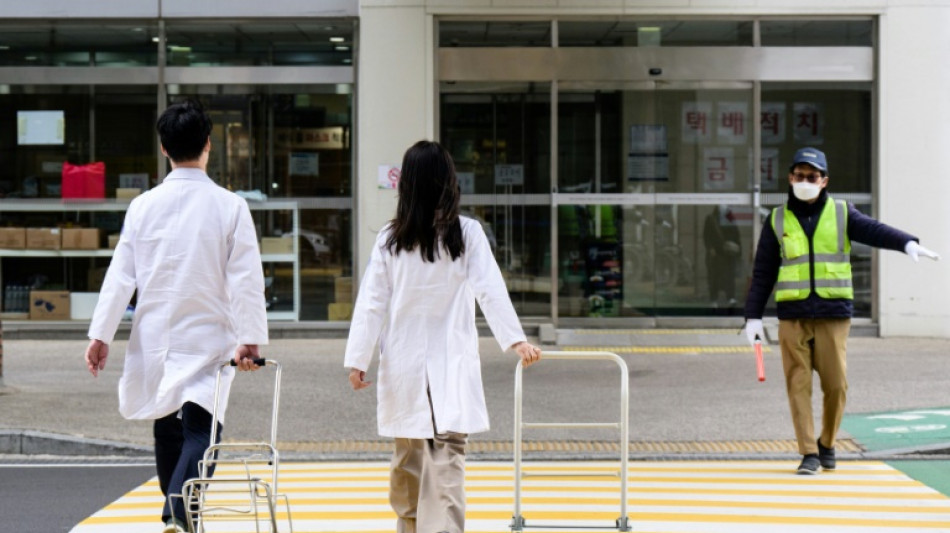
-
 Cambodia asks Thailand to move border talks to Malaysia
Cambodia asks Thailand to move border talks to Malaysia
-
In Bulgaria, villagers fret about euro introduction

-
 Key to probe England's 'stag-do' drinking on Ashes beach break
Key to probe England's 'stag-do' drinking on Ashes beach break
-
Delayed US data expected to show solid growth in 3rd quarter

-
 Thunder bounce back to down Grizzlies, Nuggets sink Jazz
Thunder bounce back to down Grizzlies, Nuggets sink Jazz
-
Amazon says blocked 1,800 North Koreans from applying for jobs

-
 Trump says US needs Greenland 'for national security'
Trump says US needs Greenland 'for national security'
-
Purdy first 49er since Montana to throw five TDs as Colts beaten

-
 North Korea's Kim tours hot tubs, BBQ joints at lavish new mountain resort
North Korea's Kim tours hot tubs, BBQ joints at lavish new mountain resort
-
Asian markets rally again as rate cut hopes bring Christmas cheer

-
 Australian state poised to approve sweeping new gun laws, protest ban
Australian state poised to approve sweeping new gun laws, protest ban
-
Trapped under Israeli bombardment, Gazans fear the 'new border'

-
 Families want answers a year after South Korea's deadliest plane crash
Families want answers a year after South Korea's deadliest plane crash
-
Myanmar's long march of military rule

-
 Disputed Myanmar election wins China's vote of confidence
Disputed Myanmar election wins China's vote of confidence
-
Myanmar junta stages election after five years of civil war

-
 Ozempic Meals? Restaurants shrink portions to match bite-sized hunger
Ozempic Meals? Restaurants shrink portions to match bite-sized hunger
-
'Help me, I'm dying': inside Ecuador's TB-ridden gang-plagued prisons

-
 Australia's Cummins, Lyon out of fourth Ashes Test
Australia's Cummins, Lyon out of fourth Ashes Test
-
US singer Barry Manilow reveals lung cancer diagnosis

-
 'Call of Duty' co-creator Vince Zampella killed in car crash
'Call of Duty' co-creator Vince Zampella killed in car crash
-
MindMaze Therapeutics: Consolidating a Global Approach to Reimbursement for Next-Generation Therapeutics

-
 Decentralized Masters Announced as the Best Crypto Course of 2025 (Courses on Cryptocurrency Ranked)
Decentralized Masters Announced as the Best Crypto Course of 2025 (Courses on Cryptocurrency Ranked)
-
Trump says would be 'smart' for Venezuela's Maduro to step down

-
 Steelers' Metcalf suspended two games over fan outburst
Steelers' Metcalf suspended two games over fan outburst
-
Salah, Foster take Egypt and South Africa to AFCON Group B summit

-
 Napoli beat Bologna to lift Italian Super Cup
Napoli beat Bologna to lift Italian Super Cup
-
Salah snatches added-time winner for Egypt after Zimbabwe scare

-
 Penalty king Jimenez strikes for Fulham to sink Forest
Penalty king Jimenez strikes for Fulham to sink Forest
-
Kansas City Chiefs confirm stadium move

-
 Liverpool rocked by Isak blow after surgery on ankle injury
Liverpool rocked by Isak blow after surgery on ankle injury
-
US stocks push higher while gold, silver notch fresh records

-
 Deadly clashes in Aleppo as Turkey urges Kurds not to be obstacle to Syria's stability
Deadly clashes in Aleppo as Turkey urges Kurds not to be obstacle to Syria's stability
-
Is the United States after Venezuela's oil?

-
 Trump admin halts US offshore wind projects citing 'national security'
Trump admin halts US offshore wind projects citing 'national security'
-
Right wing urges boycott of iconic Brazilian flip-flops

-
 From misfits to MAGA: Nicki Minaj's political whiplash
From misfits to MAGA: Nicki Minaj's political whiplash
-
Foster grabs South Africa winner against Angola in AFCON

-
 Russia pledges 'full support' for Venezuela against US 'hostilities'
Russia pledges 'full support' for Venezuela against US 'hostilities'
-
Spotify says piracy activists hacked its music catalogue

-
 Winter Olympics organisers resolve snow problem at ski site
Winter Olympics organisers resolve snow problem at ski site
-
Fuming Denmark summons US ambassador over Greenland envoy

-
 UK's street artist Banksy unveils latest mural in London
UK's street artist Banksy unveils latest mural in London
-
Rugby players lose order challenge in brain injury claim

-
 UK singer Chris Rea dies at 74, days before Christmas
UK singer Chris Rea dies at 74, days before Christmas
-
Last of kidnapped Nigerian pupils handed over, government says

-
 Zambia strike late to hold Mali in AFCON opener
Zambia strike late to hold Mali in AFCON opener
-
Outcry follows CBS pulling program on prison key to Trump deportations

-
 Sri Lanka cyclone caused $4.1 bn damage: World Bank
Sri Lanka cyclone caused $4.1 bn damage: World Bank
-
Billionaire Ellison offers personal guarantee for son's bid for Warner Bros


Quit medicine for farming? South Korean doctors speak out
From the outside, Seoul's main hospitals seem unchanged: ambulances pull up, patients walk in, staff in white coats walk around purposefully. But for weeks, South Korean healthcare has been struggling.
Surgeries have been cancelled, crucial chemotherapy sessions delayed, and it is nearly impossible to get a walk-in appointment since thousands of junior doctors walked off the job on February 20 in a standoff with the government over medical training reforms.
AFP spoke with those involved:
- Trainee doctors -
The medical reforms, which seek to train up more doctors, plus the government's "draconian" reaction to doctors' opposition is, junior medics say, enough to drive some of them out of the profession for good.
"After this situation is over, I plan to go to a rural area in Yeongdong, North Chungcheong Province, to cultivate grapes," Ryu Ok Hada, a trainee doctor who resigned, said.
Other doctors are thinking: "I could live a happier life by going to the United States and running a food truck. I could make people happy without feeling this level of humiliation," he told reporters.
Junior doctors say they are overworked and underpaid, and argue the reforms will erode service quality while doing nothing to fix core issues in healthcare provision.
"Even if a large number of doctors are produced, if they do not work in essential medical areas and instead move to private clinics or other fields, it does not align with the (government's) initial purpose," Park Dan, the head of the Korean Intern Resident Association, told local media.
- Patients -
Due to existing shortages of doctors and a concentration of medical professionals in the capital Seoul, patients like Jang Sung-ja, who has ovarian cancer, already have to travel hundreds of kilometers for treatment.
But since the doctors went on strike, her treatment has been paused.
"I live in Daegu and the hospital is in Seoul, and I'm just waiting to hear back from them after being informed that the session has been postponed," she said.
"The hospital doesn't really answer when you call them and my children are very worried about me."
Delays and a lack of clarity around treatment plans are increasingly common for patients with major illnesses, which patient advocacy group the Korea Severe Disease Association, says is unacceptable.
"Patients are still missing out on the golden time for treatment," they said in a statement, blaming both striking doctors and the government for the dire situation.
- The government -
For years, successive South Korean governments have attempted to increase medical school enrollment figures and create more doctors to ease shortages, but such reforms have always been abandoned in the face of staunch opposition from medics.
This time, the government is standing by its plan, saying that without rapid reforms the country will not have enough doctors to deal with its rapidly ageing population.
The reforms "cannot and should not be the subject of negotiation or compromise," President Yoon Suk Yeol said.
The plan will see 2,000 more students admitted to medical schools annually from next year to address what Seoul says is one of the lowest doctor-to-population ratios among developed nations.
Doctors who refuse to return to work face legal action, including the suspension of their medical licenses.
- Senior doctors -
Senior doctors have not joined the strikes -- but many have publicly sympathised with their junior colleague's plight, claiming the government training reforms will not do much to fix broader issues.
"Who would benefit the most when there is an excess of trainees in a field? It would be the directors of general hospitals, wouldn't it?" said Chung Jin-haeng, a professor at Seoul National University's college of medicine.
"With an abundance of inexpensive medical personnel, they can assign all of the night shifts to them," she told local media.
- Activists -
South Korea has a government-funded health insurance system which ensures no one will be denied life-saving treatment.
But activists say inequalities still exist.
The healthcare system's biggest problem is that most doctors are concentrated in Seoul, leading to access issues in rural areas.
The private sector also dominates provision, with state-run institutions accounting for just five percent of the total number of hospitals nationwide.
"Regardless of who wins this battle between doctors and the government, neither party has the ability to establish a truly essential alternative -- an enhanced public healthcare system," healthcare activist Yi Seo-young told AFP.
D.Kaufman--AMWN

